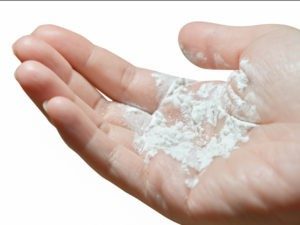Written by: Shepard Law Firm Staff
Talcum powder and baby powder are well-known products that the average consumer would have little concern with using on a regular basis. However, new information has recently arisen that links the regular use of talcum powder to ovarian cancer in women.
Manufacturers of talcum powder products and companies that mined and supplied talc have previously faced lawsuits over allegations that the mines from which their talc originated was also contaminated with asbestos. When regular users of these talc products (or workers in factories and mines who were regularly exposed to talc) developed lung cancer or mesothelioma, the cause of the disease was the asbestos contamination, not the talc itself.
In the most recent wave of cases against manufacturers of talcum powder products such as Johnson & Johnson, the allegation is that the talc itself is the carcinogen. Over the past year, a number of women have filed lawsuits against Johnson & Johnson, claiming that they have developed ovarian cancer as a result of their regular use of Johnson & Johnson’s baby powder. These cases allege that Johnson & Johnson knew that its Baby Powder and Shower to Shower Powder talc products cause ovarian cancer, and failed to warn women who used these products of the potential dangers.
While litigation against asbestos product manufacturers on behalf of individuals with mesothelioma or lung cancer has been going on for decades, litigation involving talc and ovarian cancer is a very recent development. When a large number of cases are filed based on a new legal theory, courts will often conduct what are known as bellwether trials to test the merits of the plaintiff’s claims and create a range of likely jury verdicts. As the medical link between talc exposure and ovarian cancer is not nearly as well-documented as the link between asbestos exposure and mesothelioma, these bellwether trials will be very important for existing as well as future claims made by women who develop ovarian cancer as a result of exposure to talc products. Judges that oversee groups of cases can conduct these bellwether trials in a variety of manners.

At least two juries have found Johnson & Johnson liable and returned 8-figure verdicts in early bellwether trials.
- In February 2016, a Missouri jury awarded $72 million to the family of a woman who died from ovarian cancer after using Johnson & Johnson talc products for more than three decades. This verdict included $62 million in punitive damages, meant to punish Johnson & Johnson for the jury’s findings that the company knew about the cancer risks from its products for decades but failed to provide warnings to its customers or to the medical community.
- In May 2016, another Missouri jury awarded $55 million in damages (including $50 million in punitive damages) to a woman who developed ovarian cancer after using Johnson & Johnson’s talc products for nearly 40 years. After undergoing a hysterectomy, talc was found in the plaintiff’s ovarian tissue. Once again, the jury found that Johnson & Johnson knew that its products caused ovarian cancer, and failed to warn users of the danger.
While the ovarian cancer litigation against Johnson & Johnson and other manufacturers of talc products is still in its early stages, these recent cases show that the medical link between use of talc products and the development of ovarian cancer is strong enough to result in favorable plaintiff’s verdicts. If you or a close family member have developed ovarian cancer and are a regular user of these products, please do not hesitate to contact us for a free consultation.